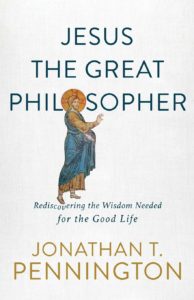Jonathan T. Pennington’s Jesus the Great Philosopher: Rediscovering the Wisdom Needed for the Good Life (Brazos Press, 2020) is, among other things, a work of philosophical retrieval.
 In the first few chapters, Pennington clears away some of the distinctly modern fog surrounding the word ‘philosophy.’ He does so by returning to ancient paths. In the ancient world, “philosophy was an allegiance to a certain way of seeing and being in the world, learned and lived in community for the purpose of finding the Good Life” (35). As such, philosophers sought to put forth “a way of being in the world that offered true life and flourishing” (19). They were dedicated to the “intentional education of the whole person – body, mind, [and] spirit” (25). Via the practice of philosophy, one sought to align one’s actions, thoughts, and feelings with ‘the Good.’ The philosophers defined the Good as the highest organizing principle, or wisdom (logos), of the cosmos. Thus, ancient philosophy was a holistic endeavor in which one sought to bring about a deep integration between one’s life and the Good, the True, and the Beautiful.
In the first few chapters, Pennington clears away some of the distinctly modern fog surrounding the word ‘philosophy.’ He does so by returning to ancient paths. In the ancient world, “philosophy was an allegiance to a certain way of seeing and being in the world, learned and lived in community for the purpose of finding the Good Life” (35). As such, philosophers sought to put forth “a way of being in the world that offered true life and flourishing” (19). They were dedicated to the “intentional education of the whole person – body, mind, [and] spirit” (25). Via the practice of philosophy, one sought to align one’s actions, thoughts, and feelings with ‘the Good.’ The philosophers defined the Good as the highest organizing principle, or wisdom (logos), of the cosmos. Thus, ancient philosophy was a holistic endeavor in which one sought to bring about a deep integration between one’s life and the Good, the True, and the Beautiful.
Modern philosophers have largely abandoned the ancient understanding of philosophy as a holistic practice related to all of life. Modern philosophers have largely abandoned the ancient understanding of philosophy as a holistic practice related to all of life. Share on X They are a group of thinkers who no longer believe that the universe has any inherent order or foundational wisdom, much less an ultimate Source of goodness, beauty, or truth. This is complicated by the fact that modern philosophers tend to wrap their philosophical discourse in the cloaks of abstraction (queue the professor who begins class by asking, ‘Does this chair really exist?’). The futility of such abstraction has become increasingly apparent. One might walk away with an interesting set of thought-experiments, but that is all. In Pennington’s words, “modern philosophy is abstract, de-personalized, and doesn’t help us learn how to live well” (211). Thus, by re-introducing readers to the aims and contours of ancient philosophy, Pennington reminds us of philosophy’s true purpose: to pursue and love wisdom for the sake of human flourishing.
The brilliance of Pennington’s work is that it shows us that Jesus and the biblical writers roamed the same philosophical territory as other ancient philosophers (such as Plato and Aristotle). Both ancient philosophy and the Bible make use of the same four, philosophical ‘compass points’: metaphysics (the nature of the cosmos), epistemology (the nature of human knowledge), ethics (the right and wrong of human action), and politics (the right and wrong of human relation) (28). From Genesis to Revelation, we are presented with, or rather confronted by, a “divinely given metaphysic, epistemology, virtue ethic, and political philosophy based on the ultimate Good, God himself” (52). Likewise, in the four Gospels we find Jesus making profound philosophical claims about the world and our place in it. He makes metaphysical claims about the nature of ultimate reality (i.e., God his Father), epistemological claims about the nature of truth (i.e., truth’s rootedness in his own person), ethical claims about the nature of the Good (i.e., loving God and neighbor), and political claims about the nature of the world’s true government (i.e., the kingdom of heaven). Thus, for Pennington, the Bible is a ‘divinely given ancient philosophy’ which culminates in the person of Jesus Christ — “in whom are hidden all treasures of wisdom and knowledge” (Col 2:3).
What are the on-the-ground implications of Pennington’s argument for Jesus as philosopher? Not just a philosopher, but the great Philosopher? First, when we become more aware of the larger philosophical context into which Jesus spoke, we begin to notice a peculiar earthiness in his teachings. In other words, Jesus offers the world much more than a ‘get-out-of-hell-free’ card. Instead, he sets forth a vision for human living and being, here on planet earth, which ultimately leads to true and lasting happiness (205-211). Secondly, recognizing the philosophical nature of Jesus’s teachings leads to a deeper awareness of the fullness of his Person. Pennington makes clear throughout the book: ascribing the title ‘philosopher’ to Jesus is not meant to diminish other aspects of Jesus’s character (such as his divinity or lordship). Recognizing the philosophical nature of Jesus’s teachings leads to a deeper awareness of the fullness of his Person. Share on X
Rather, the title ‘philosopher’ is meant to enhance our comprehension of the fullness of his Person. Lastly, Pennington’s shows us the ways in which Jesus, as our great philosopher, speaks directly to the deepest aspects of our humanity (such as our emotions and relationships). Altogether, Jesus the Great Philosopher is an intriguing and insightful book, one which joins the apostle Paul in proclaiming that Jesus is truly “the wisdom of God” (1 Cor 1:24).


